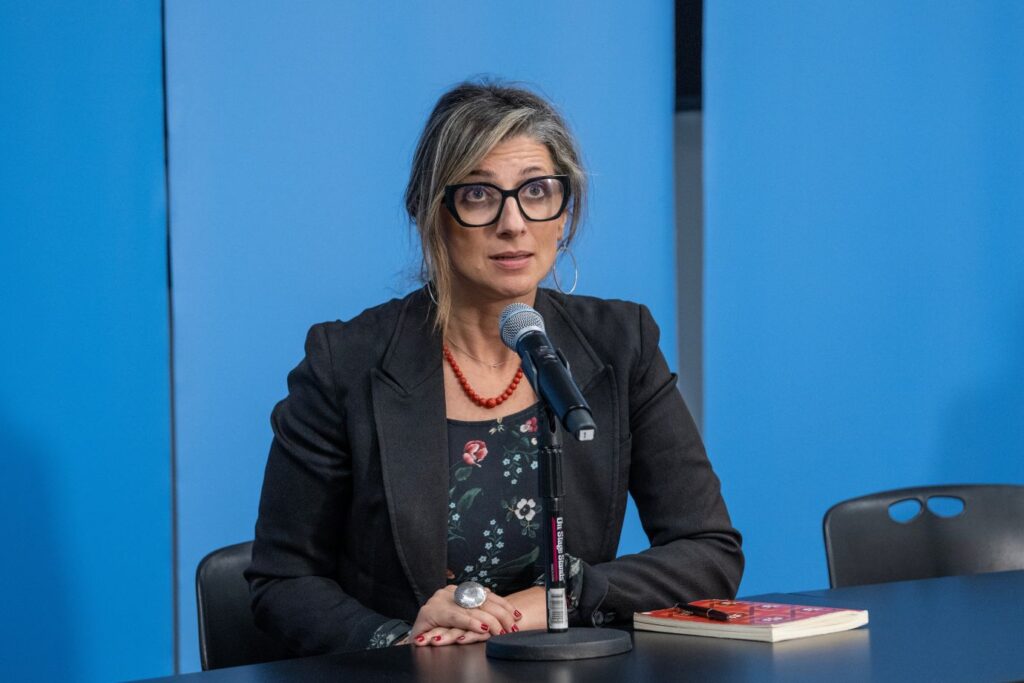Francesca Albanese is a woman who refuses to be silenced, fearlessly confronting uncomfortable truths that others shy away from.
As the United Nations Special Rapporteur on the situation of human rights in the Palestinian Territories occupied since 1967, Albanese has become a lightning rod for controversy and courage. Her recent sanctioning by the United States marks a pivotal moment not only in international human rights advocacy but also in the ongoing struggle women face in shaping global discourse.
The sanctions, announced by U.S. Secretary of State Marco Rubio under a Presidential Executive Order, accuse Albanese of engaging with the International Criminal Court (ICC) to investigate and potentially prosecute U.S. and Israeli nationals without their consent. Amnesty International argued that this is a “shameless and transparent attack on the fundamental principles of international justice”. The move has also been widely condemned by UN officials, who warn that it sets a dangerous precedent and undermines the independence of UN-appointed experts.
Albanese’s work has been unapologetically critical of Israel’s military actions in Gaza, which she has described as “one of the cruellest genocides in modern history”. Her advocacy for ICC arrest warrants against Israeli officials, including Prime Minister Benjamin Netanyahu, has drawn ire from powerful governments but earned her admiration from human rights defenders worldwide. Her stance is not just a legal argument it’s a moral one, rooted in the belief that international law must apply equally regardless of political alliances.
What makes Albanese’s defiance particularly significant is that she is a woman challenging entrenched systems of power in a male-dominated arena. Her courage echoes the legacy of other formidable women in history who have dared to confront injustice head-on.
Consider Eleanor Roosevelt, who played a pivotal role in drafting the Universal Declaration of Human Rights. Despite opposition, she championed the idea that human rights are universal and indivisible. Like Albanese, Roosevelt faced criticism for her outspoken views but remained steadfast in her mission.
Or Rosa Parks, whose quiet defiance on a Montgomery bus sparked a movement. Parks’ refusal to accept systemic racism changed the course of American history.
Or the remarkable Malala Yousafzai who was shot for advocating for girls’ education in Pakistan and continues to challenge global leaders to prioritise girls’ education and equality.
The resilience and refusal of these exceptional women to accept the normalisation of racism, violence, inequality and occupation is a legacy of fearless advocacy. Francesca Albanese is using her platform to demand accountability and has faced threats and backlash for speaking uncomfortable truths.
The sanctioning of Albanese is not just a political manoeuvre it’s a gendered response to a woman who refuses to conform. It reflects a broader discomfort with women who wield influence and challenge the status quo. In sanctioning her, the U.S. is not only punishing a UN expert but sending a chilling message to women in diplomacy: speak out and you may be silenced.
Yet, Albanese’s defiance is a beacon for gender equality. Her actions demonstrate that women are not only capable of leading global human rights efforts but they are essential to them. Her work underscores the importance of having diverse voices in international law, especially those willing to confront uncomfortable realities. Moreover, her case highlights the intersection of gender and justice. Women in conflict zones, particularly in Palestine, bear the brunt of occupation and violence. Albanese’s advocacy brings their stories to the forefront, challenging the global community to respond not with platitudes but with action.
The UN’s call for the reversal of sanctions against Albanese is a crucial step. It affirms the independence of Special Rapporteurs and the importance of protecting those who call out injustices. But more than that, it’s a defence of the principle that human rights are not negotiable.
Francesca Albanese may be sanctioned, but she is not silenced. Her voice joins a chorus of strong women throughout history who have dared to challenge injustice, often at great personal cost. Her story is a reminder that progress is never comfortable and change is never easy but it is always necessary.
Angela Davis, a renowned American political activist, scholar, and author once said: “I am no longer accepting the things I cannot change. I am changing the things I cannot accept.” Francesa Albanese is not waiting for permission to speak truth to power she is doing it, boldly and unapologetically.
In standing firm, Albanese is not just defending the rights of the Palestinian people, she is defending the very idea that international law must be impartial, that human dignity must be universal and that women have every right to lead that charge.
Support Women’s Agenda! We are 100% independent and women-owned. We’re covering the Federal Election from the perspective of what matters to women, and always keeping the issues that matter for women on the daily agenda. Foundation memberships are just $5 a month.
Bonus: you’ll receive our weekly editor’s wrap of the key stories to know every Saturday.


